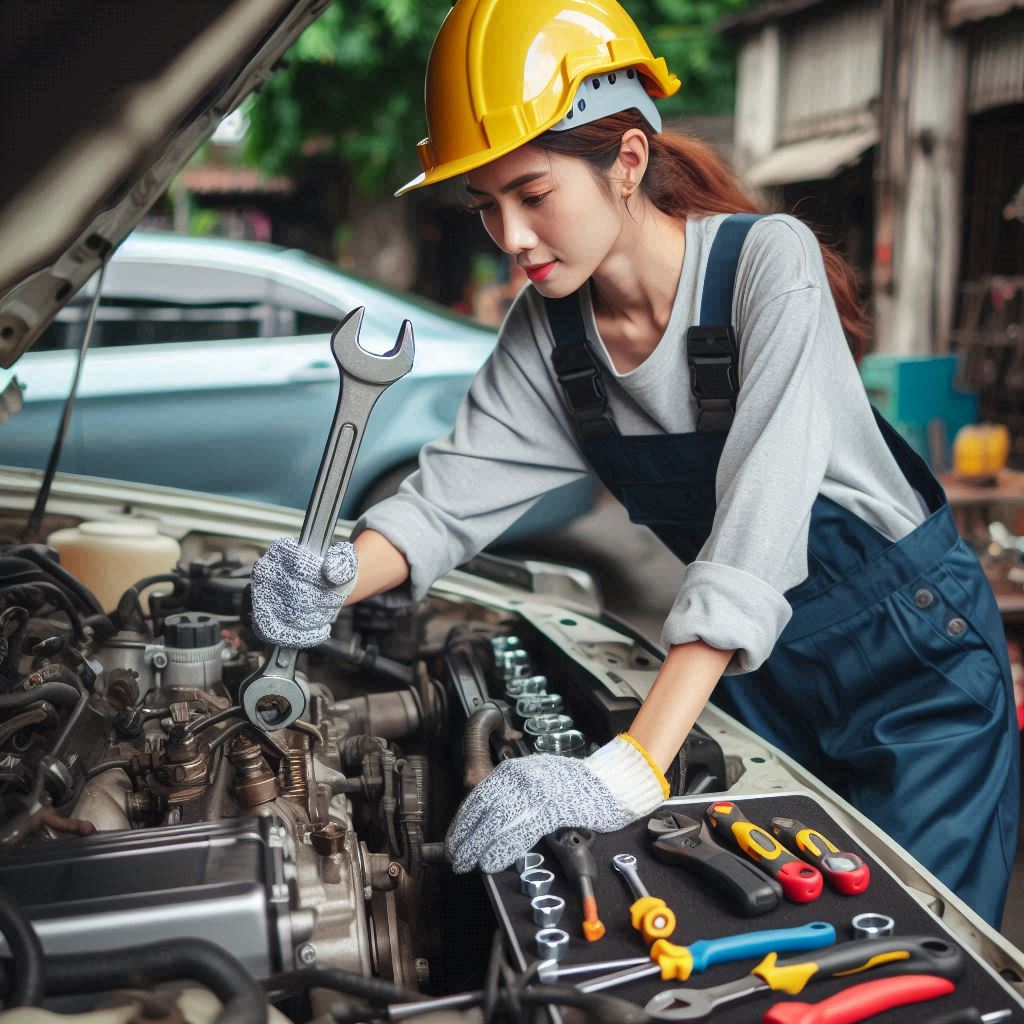Introduction
Overview of the History of Women in Automotive Engineering
The history of women in automotive engineering showcases their evolving role in a traditionally male-dominated field.
Early pioneers like Bertha Benz played a crucial role in demonstrating the automobile‘s potential.
Over the decades, women have increasingly contributed to automotive innovations and advancements.
Their presence, once minimal, has grown to include leaders in engineering, design, and technology.
Each era has seen more women breaking into this field, gradually transforming the industry with their expertise and vision.
Importance of Discussing Women Breaking Barriers in This Field
Discussing women breaking barriers in automotive engineering is essential for several reasons.
It highlights their significant contributions and the progress made toward gender equality.
By showcasing their achievements, we inspire future generations and encourage more women to enter the field.
Recognizing these milestones fosters a more inclusive industry and demonstrates the value of diverse perspectives.
Celebrating these successes not only honors past achievements but also promotes ongoing progress and innovation in automotive engineering.
Challenges Faced by Women in Automotive Engineering
Gender Stereotypes and Biases
Women in automotive engineering face pervasive gender stereotypes and biases.
Many people incorrectly assume that women lack the technical skills for these roles.
This stereotype is not only inaccurate but also detrimental, limiting opportunities for women.
Such biases can discourage women from pursuing or advancing in automotive engineering careers.
Overcoming these stereotypes is crucial for creating a more inclusive industry.
Lack of Representation and Mentorship
Another significant challenge is the lack of representation and mentorship for women.
The field is still male-dominated, resulting in few female role models.
This underrepresentation can make it difficult for aspiring women engineers to envision themselves in these roles.
Without strong mentorship, women may struggle to navigate their careers effectively.
Robust mentorship programs are essential to support and guide women in this field.
Workplace Discrimination and Sexism
Workplace discrimination and sexism further complicate women’s progress in automotive engineering.
Women often face subtle or overt discrimination, which can undermine their contributions and career growth.
Sexist attitudes may result in women being assigned less challenging projects or receiving lower pay compared to their male colleagues.
Addressing these issues requires clear anti-discrimination policies and a commitment to creating an equitable work environment.
In summary, the challenges women face in automotive engineering include gender stereotypes, lack of representation and mentorship, and workplace discrimination.
Addressing these issues is essential for fostering a more inclusive and equitable industry.
By tackling these barriers, we can create a more supportive environment where women can thrive and contribute to the advancement of automotive engineering.
Read: The Role of Aerospace Engineers in Satellite Development
Success Stories of Women in Automotive Engineering
Successful Women Pioneers in the Field
The automotive industry boasts numerous successful women pioneers who have made remarkable strides.
One notable figure is Mary Barra, the Chairman and CEO of General Motors.
Under her leadership, GM has made significant advances in electric vehicles and autonomous driving technology.
Another influential pioneer is Carol Shelby, who played a crucial role in the development of high-performance cars.
These women have shattered glass ceilings and set new standards in automotive engineering.
Their Achievements and Contributions
Mary Barra’s achievements are exemplary.
She is the first female CEO of a major global automaker, a milestone that has inspired countless women.
Her strategic vision has helped GM embrace innovative technologies, positioning the company as a leader in the future of automotive transportation.
Carol Shelby, on the other hand, is celebrated for her role in designing the iconic Shelby Cobra and the Shelby Mustang.
Her engineering prowess and commitment to performance have left a lasting impact on the automotive world.
Another remarkable woman in automotive engineering is Alicia Boler-Davis.
She has held various leadership roles at General Motors, contributing significantly to the development of new technologies and improving manufacturing processes.
Her work has not only advanced the field but also paved the way for other women in engineering roles.
Inspire Other Women to Pursue Careers in Automotive Engineering
These success stories serve as powerful inspiration for other women.
The achievements of Mary Barra, Carol Shelby, and Alicia Boler-Davis demonstrate that women can excel in automotive engineering and drive innovation.
Their contributions highlight the critical role women play in shaping the future of the industry.
For aspiring female engineers, these pioneers offer a blueprint for success.
Their journeys show that perseverance, expertise, and leadership can lead to significant accomplishments.
By following in their footsteps, other women can pursue careers in automotive engineering with confidence and ambition.
The success stories of women like Mary Barra, Carol Shelby, and Alicia Boler-Davis illustrate the incredible impact women can have in automotive engineering.
Their achievements and contributions not only advance the field but also serve as a beacon for aspiring women engineers.
Their stories inspire others to pursue careers in this dynamic and evolving industry.
Read: The Impact of Aerospace Engineering on Modern Life
Strategies for Breaking Barriers
Promoting Diversity and Inclusion in the Industry
Promoting diversity and inclusion is crucial for breaking barriers in automotive engineering.
Organizations should implement policies that actively seek to increase the representation of women and underrepresented groups.
This involves creating inclusive recruitment practices and fostering a workplace culture that values diverse perspectives.
By prioritizing diversity, companies can create a more equitable environment where all employees feel valued and empowered.
Providing Support and Resources for Women Engineers
Supporting women engineers through dedicated resources is essential for overcoming industry barriers.
Companies can establish mentorship programs to provide guidance and career development opportunities.
Networking events and professional development workshops can also help women build connections and enhance their skills.
Additionally, offering flexible work arrangements and support for work-life balance can address some of the unique challenges faced by women engineers.
Advocating for Equal Opportunities and Recognition
Advocating for equal opportunities and recognition is vital for ensuring that women receive fair treatment in the industry.
Organizations should enforce policies that promote equitable pay and advancement opportunities.
Regularly reviewing and addressing potential biases in performance evaluations and promotion practices can help ensure fairness.
Recognizing the achievements of women engineers through awards and leadership roles also helps highlight their contributions and set a positive example for others.
In summary, breaking barriers in automotive engineering requires a multifaceted approach.
Promoting diversity and inclusion, providing support and resources, and advocating for equal opportunities are key strategies.
By implementing these practices, the industry can foster a more inclusive and supportive environment where women can thrive and contribute their talents effectively.
Read: How Agricultural Engineers Improve Crop Yields

Importance of Diversity in Automotive Engineering
How Diversity Benefits Innovation and Creativity
Diversity is a powerful driver of innovation and creativity in automotive engineering.
When teams consist of individuals with varied backgrounds and perspectives, they approach problems differently.
This diversity of thought can lead to more innovative solutions and creative ideas.
For example, diverse teams are more likely to explore unconventional approaches and challenge traditional assumptions.
This results in cutting-edge designs and technologies that push the industry forward.
The Impact of Having More Women in the Field
Increasing the number of women in automotive engineering has a profound impact on the field.
Women bring unique perspectives and skills that enhance problem-solving and decision-making processes.
Their involvement leads to more comprehensive and user-centered designs, as they often consider different factors and needs.
Moreover, having more women in the field helps to challenge stereotypes and encourage more young women to pursue engineering careers.
This creates a positive feedback loop that benefits the industry as a whole.
The Need for Diverse Perspectives in Designing Vehicles
Diverse perspectives are essential in designing vehicles that meet the needs of a broad customer base.
Cars and automotive technologies must cater to a wide range of users, each with unique preferences and requirements.
By incorporating diverse viewpoints into the design process, engineers can create products that are more inclusive and effective.
For instance, considering input from people of different ages, genders, and abilities ensures that vehicles are more accessible and user-friendly.
This approach not only enhances customer satisfaction but also expands market reach.
In summary, diversity in automotive engineering is crucial for driving innovation and creativity.
The presence of more women and diverse perspectives enriches the field and leads to more inclusive and effective vehicle designs.
Embracing diversity not only benefits the industry but also helps create products that better serve a diverse global market.
Read: Biomedical Engineering: Industry Outlook 2024
Initiatives and Organizations Supporting Women in Automotive Engineering
Showcase Programs and Initiatives Aimed at Empowering Women in the Industry
Several programs and initiatives focus on empowering women in automotive engineering.
The Society of Women Engineers (SWE) offers resources and networking opportunities specifically for women in engineering fields.
SWE‘s initiatives include mentorship programs, career development workshops, and conferences that help women advance their careers.
Additionally, the Women in Automotive (WIA) organization works to support and elevate women in the automotive industry through professional development and networking events.
The Automotive Women’s Alliance Foundation (AWAF) also plays a significant role by providing scholarships, mentorship, and career development opportunities.
These initiatives help women gain access to the resources they need to succeed and advance in the automotive engineering field.
The Role of Professional Organizations in Promoting Gender Equality
Professional organizations are crucial in promoting gender equality within automotive engineering.
Groups like SWE and WIA actively work to create inclusive environments by advocating for equal opportunities and recognizing the achievements of women.
They provide platforms for women to share their experiences and challenges, fostering a supportive community.
These organizations also collaborate with companies to develop and implement diversity and inclusion policies, ensuring that gender equality becomes an integral part of organizational culture.
Transform Your Career Today
Unlock a personalized career strategy that drives real results. Get tailored advice and a roadmap designed just for you.
Start NowResources for Women Interested in Pursuing a Career in Automotive Engineering
For women interested in pursuing a career in automotive engineering, several resources are available.
Online platforms such as Women in Engineering (WiE) offer valuable information on career paths, education, and job opportunities in automotive engineering.
Educational institutions often provide scholarships and support programs aimed at women pursuing degrees in engineering fields.
Networking events and conferences hosted by organizations like SWE and WIA offer excellent opportunities for women to connect with industry professionals and gain insights into the field.
Additionally, many organizations offer online courses and webinars that focus on specific skills and knowledge areas relevant to automotive engineering.
In summary, various initiatives and organizations support women in automotive engineering by providing resources, networking opportunities, and professional development.
Professional organizations play a key role in promoting gender equality, while numerous resources are available for women interested in pursuing careers in this field.
By leveraging these supports, women can successfully navigate and advance in the automotive engineering industry.
Read: Networking Tips for Biomedical Engineers
Addressing the Gender Pay Gap in Automotive Engineering
Examine the Disparities in Salary Between Men and Women in the Field
The gender pay gap remains a significant issue in automotive engineering.
Studies reveal that women in this field often earn less than their male counterparts.
Despite similar qualifications and experience, women can face disparities in salary due to various factors, including biased pay practices and underrepresentation in higher-paying roles.
These disparities can impact career progression and overall job satisfaction for women engineers.
Strategies for Closing the Gender Pay Gap
To close the gender pay gap, organizations should implement several key strategies.
First, conducting regular pay audits helps identify and address salary disparities.
By analyzing compensation data, companies can ensure that pay scales are equitable and make necessary adjustments.
Transparent salary bands and clear criteria for promotions can also help mitigate bias in pay decisions.
Establishing mentorship programs and providing career development opportunities can support women in advancing to higher-paying positions.
Additionally, implementing policies that promote work-life balance can help retain women engineers by addressing some of the barriers they face.
Training programs that address unconscious bias and educate managers about fair compensation practices are crucial for creating a more equitable pay structure.
Advocate for Fair Compensation and Equal Opportunities for Women Engineers
Advocating for fair compensation and equal opportunities involves creating a culture of accountability and fairness.
Organizations should publicly commit to gender equality and ensure that their policies reflect this commitment.
Supporting women‘s advancement through leadership development programs and ensuring that hiring practices are inclusive can contribute to a more balanced and equitable work environment.
Industry-wide initiatives can also play a role in promoting fair compensation.
Encouraging companies to join diversity and inclusion pledges, and supporting advocacy groups that work on gender pay equality can drive broader changes.
By working together, organizations and individuals can create a more equitable landscape where women engineers receive fair compensation for their contributions.
In summary, addressing the gender pay gap in automotive engineering requires a multifaceted approach.
Examining salary disparities, implementing strategies to close the gap, and advocating for fair compensation are essential steps.
By focusing on these areas, the industry can move towards greater equity and ensure that women engineers receive the recognition and remuneration they deserve.
Explore Further: Field Service Technician Success in Digital Age
Support System for Women in Automotive Engineering
The Importance of Mentorship and Networking
Mentorship and networking are critical for women in automotive engineering.
Mentors provide guidance, share industry insights, and help navigate career challenges.
They can also offer valuable advice on career advancement and overcoming obstacles.
Networking allows women to connect with other professionals, gain new perspectives, and discover opportunities for growth.
Building a strong network can lead to collaborations, job opportunities, and support from peers who understand the unique challenges of the field.
The Role of Allies in Supporting Women in Male-Dominated Industries
Allies play a vital role in supporting women in male-dominated industries like automotive engineering.
Allies advocate for gender equality, challenge biases, and promote inclusive practices within their organizations.
They can help amplify women‘s voices and support their career advancement by providing opportunities and visibility.
By actively participating in diversity and inclusion initiatives, allies contribute to creating a more equitable work environment and fostering a culture of respect and support.
Share Tips for Finding Mentorship and Building a Strong Professional Network
Finding mentorship and building a professional network can be approached strategically.
Start by identifying potential mentors within your organization or industry.
Look for individuals whose career paths you admire and who have experience in areas you want to explore.
Reach out to them with a clear message about your goals and how you believe they could help.
Participate in industry events, conferences, and workshops to expand your network.
Engage in professional organizations like the Society of Women Engineers (SWE) or Women in Automotive (WIA), which offer networking opportunities and mentorship programs.
Online platforms such as LinkedIn can also be valuable for connecting with industry professionals and joining relevant groups.
Additionally, consider joining or forming a peer support group with other women engineers.
These groups can provide mutual support, share experiences, and offer practical advice for navigating the industry.
In summary, a robust support system is essential for women in automotive engineering.
Mentorship and networking offer valuable guidance and opportunities, while allies help create a more inclusive environment.
By actively seeking mentorship and engaging in professional networks, women can enhance their careers and contribute to a more supportive and equitable industry.
Conclusion
Key Points Discussed in the Blog Post
In this blog, we explored the transformative impact of women in automotive engineering.
We examined how women are breaking barriers and driving innovation within the industry.
From leading engineering projects to developing groundbreaking technologies, their influence is profound and far-reaching.
Their contributions are not only enhancing vehicle design and performance but also pushing the industry toward a more inclusive and diverse future.
Encourage Women to Pursue Their Passion for Automotive Engineering
We encourage women to follow their passion for automotive engineering with confidence.
The field offers numerous opportunities for growth and impact.
Women bring unique perspectives and skills that can drive technological advancements and solve complex challenges.
By pursuing a career in this area, they can contribute to shaping the future of transportation.
The Impact of Women Breaking Barriers in the Field
Women breaking barriers in automotive engineering are redefining the industry.
Their achievements challenge stereotypes and foster a more inclusive environment.
Their successes pave the way for future generations and encourage ongoing progress and innovation in the field.
[E-Books for Sale]
The Big Book of 500 High-Paying Jobs in America: Unlock Your Earning Potential
$19.99 • 500 High-Paying Jobs • 330 pages
Explore 500 high-paying jobs in America and learn how to boost your career, earn more, and achieve success!
See All 500 High-Paying Jobs of this E-Book
1001 Professions Without a Degree: High-Paying American Jobs You Can Start Now
$19.99 • 1001 Professions Without a Degree • 174 pages
Discover 1001 high-paying jobs without a degree! Unlock career tips, skills, and success strategies for just $19.99!




